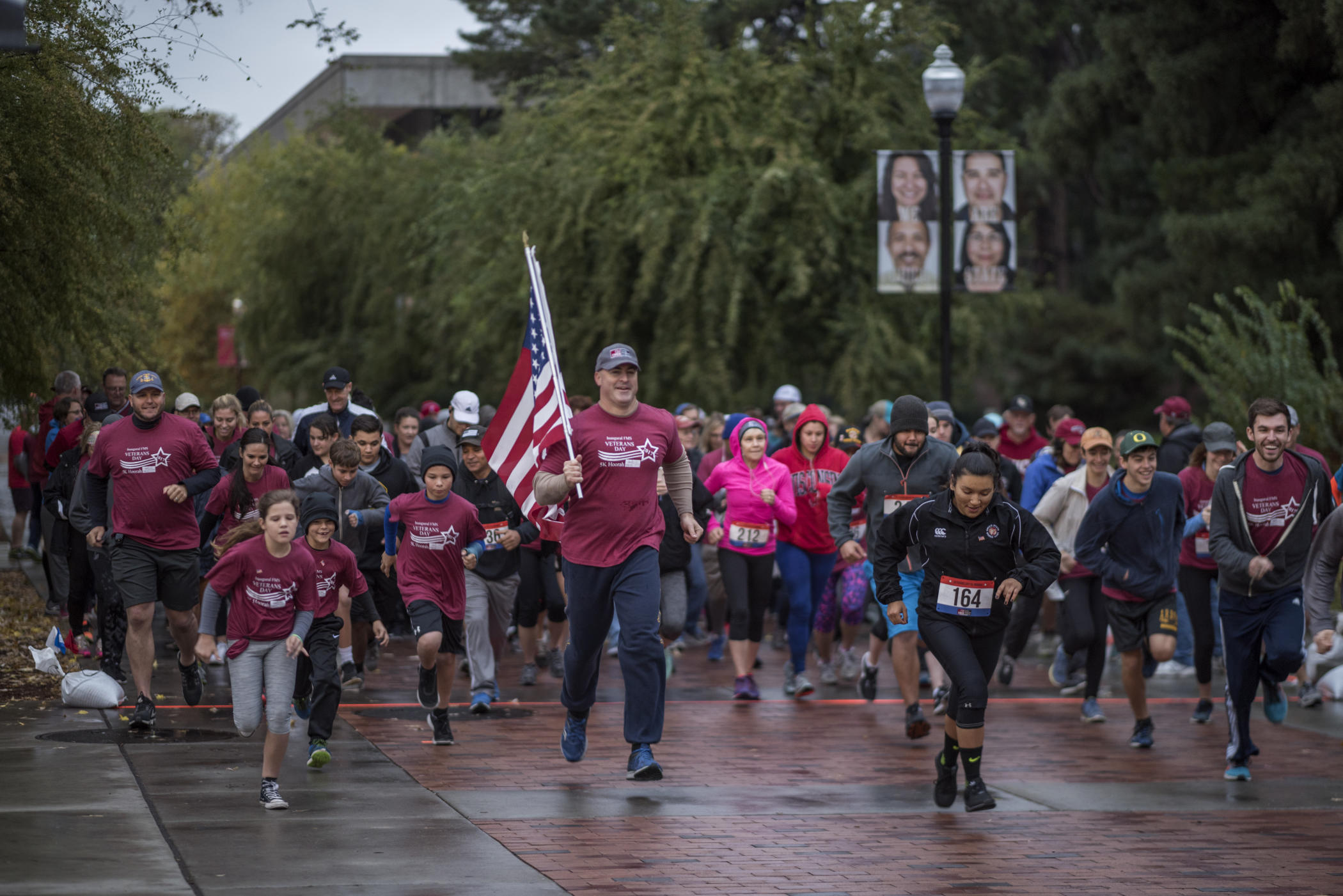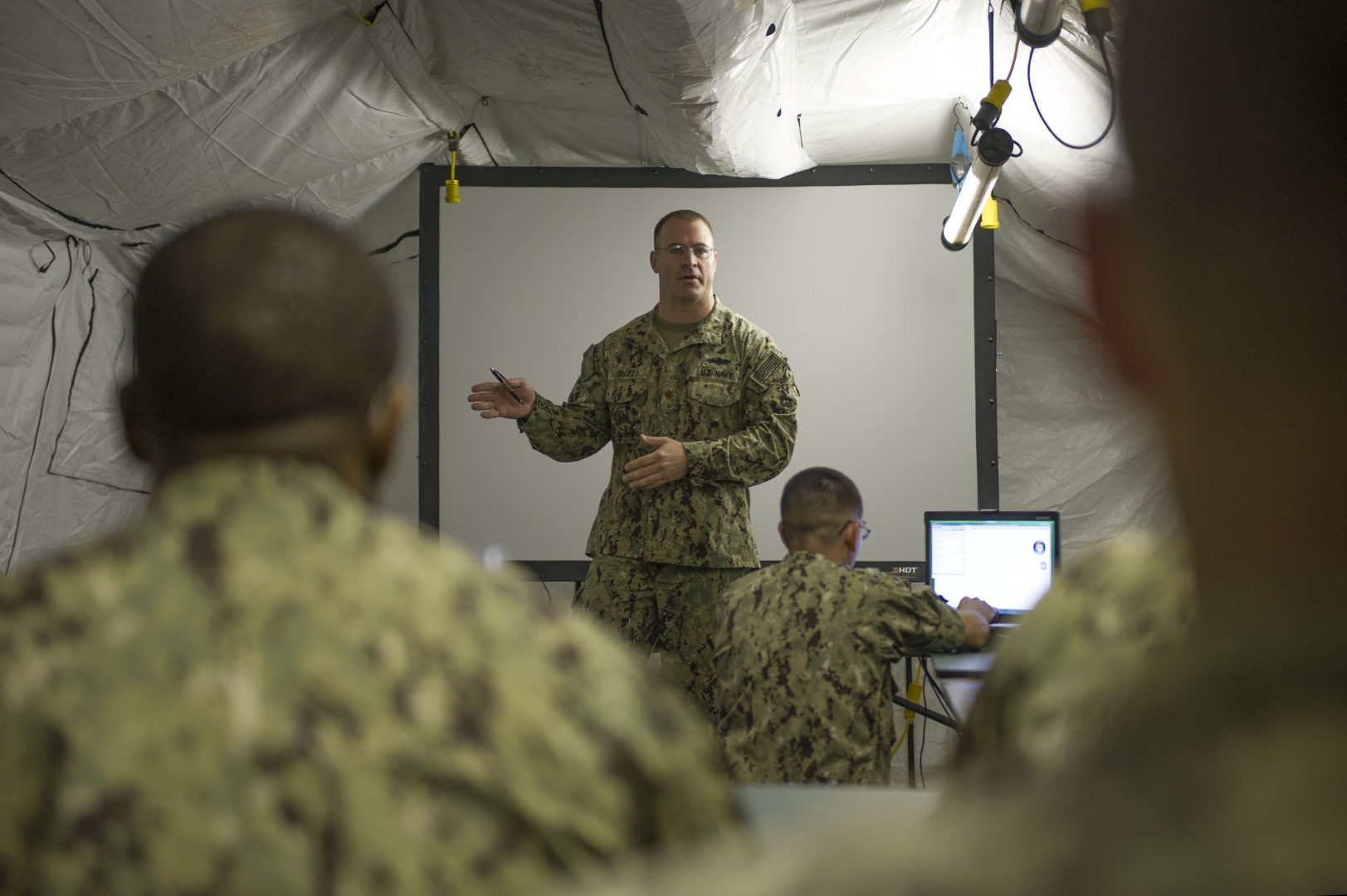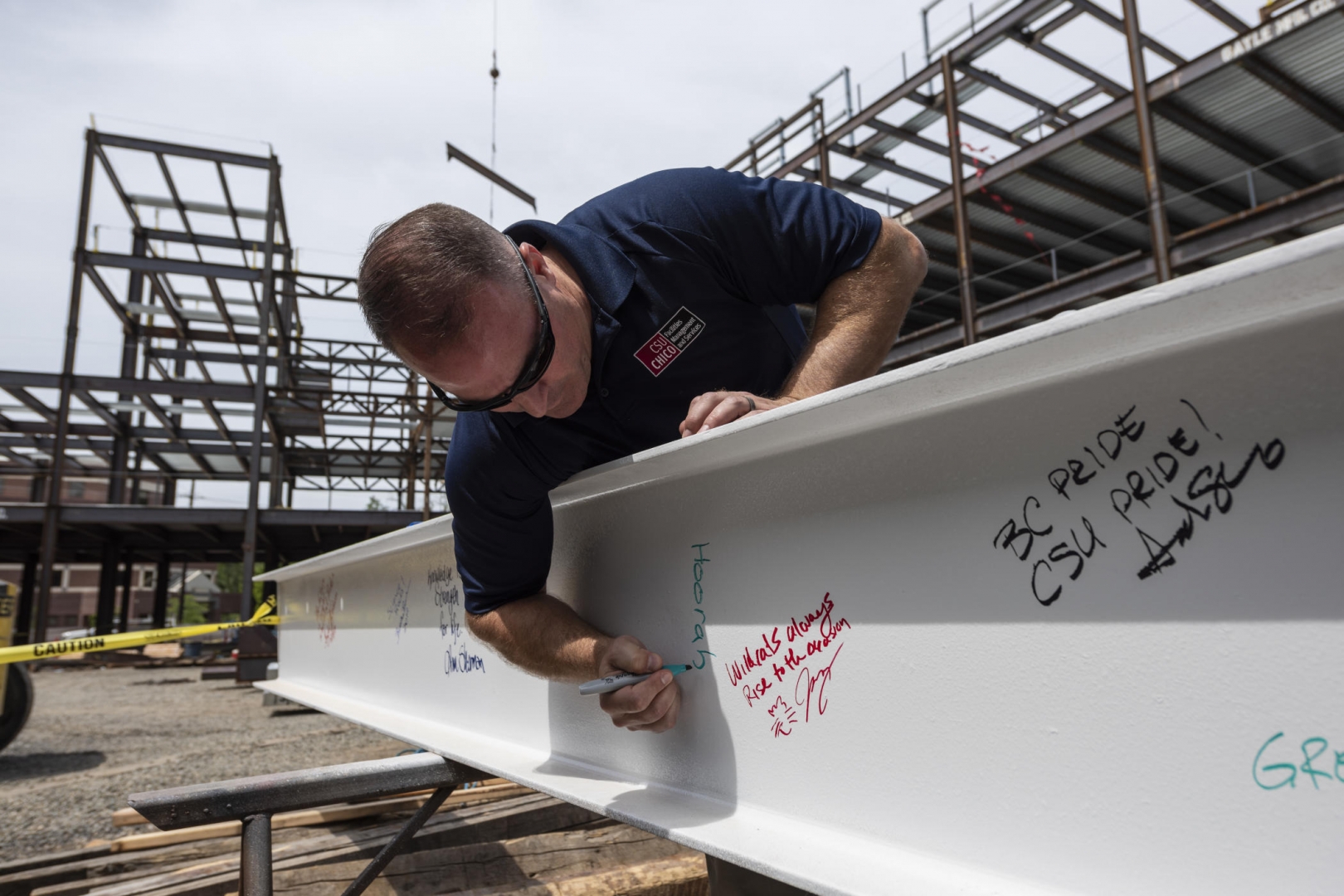Longing for Legacy: Guzzi Strives to Serve a Greater Good

Mike Guzzi carries the American flag as he runs with others that came to celebrate and honor Veterans with a Veterans Day 5k Hoorah Run/Walk through campus hosted by Facilities Management and Services FMS on Saturday, November 4, 2017 in Chico, Calif. All proceeds will go directly to support scholarship awards for CSU, Chico Student Veterans. (Jason Halley/University Photographer/CSU Chico)
With a bladed hand—thumb tight to index finger—Mike Guzzi (Civil Engineering, ’02) chops through the air in front of him. This gesture is one of his fondest lessons from his 20-plus years of military experience. He reserves it typically for one instruction: “Fix yourself.”
Many life experiences for Guzzi, Chico State’s associate vice president of facilities and capital projects, have followed that simple order. A Yuba City native, he had to repair his own situation late in high school, when challenging conditions led to a dissolve in his academic focus. Guzzi missed every deadline to apply for the football scholarships he’d so badly wanted.
One day, frustrated and preparing to go to junior college, he saw a TV recruitment ad for the US Navy and immediately picked up the phone. That decision launched a military career that set him on a civil engineering path, nurtured his natural affinity for math and planning, and helped him develop leadership skills that continue to shape his work in higher education today.
It was in the Navy that Guzzi discovered the famed Seabees—as in CBs (Construction Battalion)—a unit that taught him to organize, delegate, and develop projects over two decades. Responsible for leading civilian and military shelter construction in 27 different countries in 20 years, Guzzi hit his stride in civil engineering and planning. As lieutenant commander, he earned the Naval Facilities and Engineering Command’s Moreell Medal in 2015, a year that saw him complete 10 major projects while directing more than 4,500 engineers across three military branches.

So, perhaps nobody is better prepared than he is for the wide-ranging and high-stakes task of getting the University’s master plan for facilities and sustainability on track—and in a hurry. With a goal of a climate-neutral campus by 2030, Guzzi has embraced the challenge with gusto.
“In the military, as an officer over the last 20 years, they’d move us every two years,” Guzzi said. “We were made to be globally deployable to any kind of job at any time in any place, so I’m used to getting on board with no time to adjust. That’s kind of the situation we’re in now—there is a lot of work to be done, but we have a plan to do it.”
In his daily duties, he leads the University’s facilities operations, which include design, construction, and maintenance of buildings and grounds. He was among the first to respond to campus when several buildings flooded in a rare spring storm, regularly patrols projects ranging from greenhouse relocations to lab renovations, and spearheaded the painting of “Go Wildcats” on the back of Acker Gymnasium.
Guzzi’s first order of business when he got to campus in early 2017 was to unite the Facilities Management and Services (FMS) crew, which had previously struggled under different leadership groups. Communication was especially fragmented, a jarring concept for someone with his regimented military background. Outgoing by nature, Guzzi saw the opportunity to restore trust among the facilities crew.
By making himself accountable, he figured, he’d empower the rest of FMS to follow suit.
“I wanted everyone to understand that we’re a team, and I’m not going to be just another new person hiding up in an office trying to undermine people’s work,” he said. “Our team morale was a priority for me—it still is. But now that we’ve improved it, people keep responding. It’s amazing what we’ve gotten done.”
For those in FMS, Guzzi’s efforts didn’t go unnoticed.
“There is a feeling that he is here for the long haul,” said Durbin Sayers, manager of Custodial and Moving Services.
He noted that Guzzi has implemented systems and structure in ways that empower employees to embrace responsibility and growth—adding supervisor positions to many trades units and introducing a series of positive reinforcement programs, including employee of the month, “10-second recognition,” and “FMS Custom Challenge Coins.”
“He seems invested in a way many previous directors did not,” Sayers said. “He brings a refreshing ability to speak simply and directly, and he’s not afraid to ask the question everyone in the room is wondering.”
Guzzi’s plan for the University is based on two primary goals: Getting 132-year-old Chico State’s more antiquated infrastructure up to date—replacing or removing out-of-code systems, like old power boxes and network equipment—and helping Chico State lead the CSU’s charge in sustainable practices by refreshing inefficient structures and constructing new buildings with minimal environmental footprints. Hence projects like the new physical sciences building, which not only replaces outdated and underused Siskiyou Hall but also provides a modern alternative for the aging physical sciences building and sets the stage for 21st-century learning environments. Guzzi said this is just one of many projects his teams can all take accountability for—and that’s how he wants it. It’s a necessary step for the success of the University’s master plan.
“It’s all on us, and I keep telling people that,” Guzzi said. “It’s about bringing accountability, and building a team, building a vision we can all see together.”
As he has ever since his Navy days, Guzzi finds purpose in serving a greater good. Whether it’s building barracks for distressed tsunami survivors in the Philippines or helping create smart learning spaces for current and future students, he said, the idea of physically building a tangible legacy is what drives him.
“Doing work where I’m affecting hundreds of thousands of people for years to come is what helps me sleep well at night,” Guzzi said. “You think about how many students are going to attend classes in these buildings over the next 100 years. There will be people who will see the efforts and the work. Whether they know it or not, there’s a little stamp of Mike Guzzi on their lives. That’s really big to me.”

He strolls with purpose across campus, engaging with a smile or hearty Navy “Hoo-rah!” as he balances his days between meetings, teaching civil engineering courses, and sticking with the familiar regimented lifestyle he learned in the military. If you catch him on a Monday, for example, you find him in his standard blue FMS polo eating a sandwich downtown or headed to his weekly haircut.
Guzzi is committed to removing barriers similar to the ones he faced as a young man. To that end, he started an annual Veterans Day 5k Hoorah Walk/Run that generates scholarships for student veterans, and he also donates to the College of Engineering, Computer Sciences and Construction Management to support student success within the college. Guzzi has a vision of returning to campus in 40 years and taking stock of all the changes he helped implement—from the students who launched successful careers to the physical icons that remain.
“I want to come back and see the Wildcat statue, see ‘Wildcats’ on the back of Acker Gym, and not only think, ‘My team did that,’” he said, “but also remember who we did it for.”


